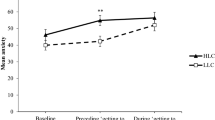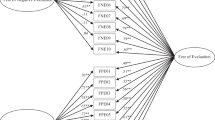Abstract
This study examined how social anxiety influences the evaluation of others, and the evaluation of the self. High (HSA; n = 24) and low (LSA; n = 24) socially anxious undergraduates watched a video of either an anxious or confident actor presenter and rated various aspects of the presenter and the presentation. Participants then gave their own speech, which they later evaluated with the same measures used to evaluate the other presenter. Both the HSA and LSA groups rated the anxious actor presenter more negatively than the confident actor presenter on most measures. The two groups did not differ in their evaluations of the actor presenters. However, when rating their own performance, the HSA group rated themselves more negatively on some measures than did the LSA group, even after controlling for observable differences in performance and anxiety between the two groups. This suggests that although socially anxious individuals may have clear performance skills deficits, they overestimate the extent to which these behavioral deficits are apparent to others.
Similar content being viewed by others
References
Alden, L. E., & Wallace, S. T. (1995). Social phobia and social appraisal in successful and unsuccessful social interactions. Behaviour Research and Therapy, 33, 497–505.
Antony, M. M., Purdon, C. L., Huta, V., & Swinson, R. P. (1998). Dimensions of perfectionism across the anxiety disorders. Behaviour Research and Therapy, 36, 1143–1154.
Clark, D. M., & Wells, A. (1995). A cognitive model of social phobia. In R. G. Heimberg, M. R. Liebowitz, D. A. Hope, & F. R. Schneier (Eds.), Social Phobia: Diagnosis, assessment, and treatment (pp. 69–93). New York: Guilford Press.
Clark, J. V., & Arkowitz, H. (1975). Social anxiety and self-evaluation of interpersonal performance. Psychological Reports, 36, 211–221.
Connor, K. M., Davidson, J. R.T, Churchill, L. E., Sherwood, A., Foa, E. B., & Weisler, R. H. (2000). Psychometric properties of the social phobia inventory (SPIN). British Journal of Psychiatry, 176, 379–386.
Coons, M. J., McCabe, R. E., Antony, M. M., Ashbaugh, A., & Swinson, R. P. (2003, March). Psychometric properties of the Social Phobia Inventory (SPIN) in a social phobia sample. Paper presented at the meeting of the Anxiety Disorders Association of America, Toronto, Ontario.
Creed, A. T., & Funder, D. C. (1998). Social anxiety: from the inside and outside. Personality and Individual Differences, 25, 19–33.
Heimberg, R. G., Acerra, M. C., & Holstein, A. (1985). Partner similarity mediates interpersonal anxiety. Cognitive Therapy and Research, 9, 443–453.
Juster, H. R., Heimberg, R. G., Frost, R. O., Holt, C. S., Mattia, J. I., & Faccenda, K. (1996). Social phobia and perfectionism. Personality and Individual Differences, 21, 403–410.
Leary, M. R., Kowalski, R. M., & Campbell, C. D. (1988). Self-presentational concerns and social anxiety: The role of generalized impression expectancies. Journal of Research in Personality, 22, 308–321.
McEwan, K. L., & Devins, G. M. (1983). Is increased arousal in social anxiety noticed by others? Journal of Abnormal Psychology, 92, 417–421.
Meleshko, K. G. A., & Alden, L. E. (1993). Anxiety and self-disclosure: Toward a motivational model. Journal of Personality and Social Psychology, 64, 1000–1009.
Niels, C., P. N., Stein, M. B., & Means-Christensen, A. (2003). Social anxiety and interpersonal perception: a social relations model analysis. Behaviour Research and Therapy, 41, 1355–1371.
Norton, P. J., & Hope, D. A. (2001). Kernels of truth or distorted perceptions: Self and observer ratings of social anxiety and performance. Behavior Therapy, 32, 765–786.
Nunnaly, J. (1978). Psychometric theory. New York: McGraw-Hill.
Purdon, C. L., Antony, M. M., Monteiro, S., & Swinson, R. P. (2001). Social anxiety in college students. Journal of Anxiety Disorders, 15, 203–215.
Rapee, R. M., & Heimberg, R. G. (1997). A cognitive-behavioral model of social anxiety in social phobia. Behaviour Research and Therapy, 35, 741–756.
Rapee, R. M., & Lim, L. (1992). Discrepancy between self- and observer ratings of performance in social phobics. Journal of Abnormal Psychology, 101, 728–731.
Roth, D., Antony, M. M., & Swinson, R. P. (2001). Interpretations for anxiety symptoms in social phobia. Behaviour Therapy and Research, 39, 129–138.
Saboonchi, F., Lundh, L. G., & Öst, L. G. (1999). Perfectionism and self-consciousness in social phobia and panic disorder with agoraphobia. Behaviour Research and Therapy, 37, 799–808.
Stopa, L., & Clark, D. M. (1993). Cognitive processes in social phobia. Behaviour Research and Therapy, 31, 255–267.
Strahan, E., & Conger, A. J. (1998). Social anxiety and its effects on performance and perception. Journal of Anxiety Disorders, 12, 293–305.
Wallace, S. T., & Alden, L. E. (1995). Social anxiety and standard setting following success or failure. Cognitive Therapy and Research, 19, 613–631.
Wallace, S. T., & Alden, L. E. (1997). Social phobia and positive social events: The price of success. Journal of Abnormal Psychology, 106, 416–424.
Author information
Authors and Affiliations
Corresponding author
Rights and permissions
About this article
Cite this article
Ashbaugh, A.R., Antony, M.M., McCabe, R.E. et al. Self-Evaluative Biases in Social Anxiety. Cogn Ther Res 29, 387–398 (2005). https://doi.org/10.1007/s10608-005-2413-9
Issue Date:
DOI: https://doi.org/10.1007/s10608-005-2413-9




